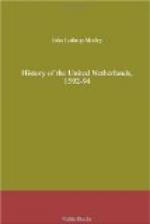The king had various plans in regard to the bestowal of the hand thus richly endowed. First and foremost it was suggested—and the idea was not held too monstrous to be even believed in by some conspicuous individuals—that he proposed espousing his daughter himself. The pope was to be relied on, in this case, to give a special dispensation. Such a marriage, between parties too closely related to be usually united in wedlock, might otherwise shock the prejudices of the orthodox. His late niece and wife was dead, so that there was no inconvenience on that score, should the interests of his dynasty, his family, and, above all, of the Church, impel him, on mature reflection, to take for his fourth marriage one step farther within the forbidden degrees than he had done in his third. Here is the statement, which, if it have no other value, serves to show the hideous designs of which the enemies of Philip sincerely believed that monarch capable.
“But God is a just God,” wrote Sir Edward Stafford, “and if with all things past, that be true that the king (’videlicet’ Henry IV.) yesterday assured me to be true, and that both his ambassador from Venice writ to him and Monsieur de Luxembourg from Rome, that the Count Olivarez had made a great instance to the pope (Sixtus V.) a little afore his death, to permit his master to marry his daughter, no doubt God will not leave it long unpunished.”
Such was the horrible tale which was circulated and believed in by Henry the Great of France and by eminent nobles and ambassadors, and at least thought possible by the English envoy. By such a family arrangement it was obvious that the conflicting claims of father and daughter to the proprietorship of France would be ingeniously adjusted, and the children of so well assorted a marriage might reign in undisputed legitimacy over France and Spain, and the rest of the world-monarchy. Should the king decide on the whole against this matrimonial project, should Innocent or Clement prove as intractable as Sixtus, then it would be necessary to decide among various candidates for the Infanta’s hand.
In Mayenne’s Opinion the Duke of Guise was likely to be the man; but there is little doubt that Philip, in case these more cherished schemes should fail, had made up his mind—so far as he ever did make up his mind upon anything—to select his nephew the Archduke Ernest, brother of the Emperor Rudolph, for his son-in-law. But it was not necessary to make an immediate choice. His quiver was full of archdukes, any one of whom would be an eligible candidate, while not one of them would be likely to reject the Infanta with France on her wedding-finger. Meantime there was a lion in the path in the shape of Henry of Navarre.




